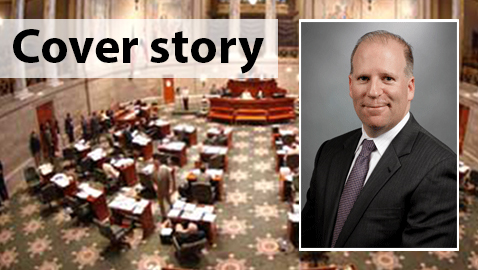By Ashley Jost
JEFFERSON CITY, Mo. — For Sen. Scott Rupp, R-St. Charles, the work that went into crafting Senate Bill 1 — the workers’ compensation legislation — required hours of listening, negotiating and ultimately, silence behind a closed door.

In order to compile what he thought to be the most effective bill to answer the needs of all parties involved and best serve Missouri workers, Rupp said he approached this bill differently than others in the past.
Since the issues involved with workers’ compensation, the second injury fund, and occupational disease came up during every session since Rupp was elected four years ago, he said he was no stranger to the background of where different parties stand now and stood in the past.
“The thing I did differently from pretty much most other bills is I quickly realized the last several years the lobbyists and special interests or concerned parties were trying to write the bill themselves, and that’s where negotiations would break down,” Rupp said.
Using last year’s bill as a starting point, Rupp said he began the process by checking the temperature of as many concerned parties as he could, asking why people thought the legislation failed during the past, gauging the extent of their comfort levels and getting background to see where the “matrix” of compromise was.
After that, Rupp said he closed the door and drafted up the bill, keeping it tight-lipped so the second substitute for the bill he was working on stood no chance of reaching the ears of any interest groups.
“My own caucus didn’t see the final substitute until 9 a.m.,” Rupp added. “I sat down with them, answered all of their questions, told them how I got there and about the history of each part based off of what I’ve seen happen [during the past few years].”
Immediately after meeting with the majority caucus, Rupp said he invited the minority caucus into his office to give them copies and answer their questions.
Sen. Scott Sifton, D-St. Louis, said by the time Rupp’s substitute was introduced, the Senate had multiple opportunities to hear the premise of the bill when the first draft was brought to the floor. A few hours after Rupp met with the minority caucus, Sifton said he and Sen. Jolie Justus, D-Kansas City, were back in the bill sponsor’s office with only “a handful” of technical or clarification corrections.

“At that point, we were able to narrow it down to maybe just one or two important topics left in the discussion,” Sifton said, adding that it became a matter of specifying the scope of occupational diseases and arriving at numbers the everyone could agree on.
Sifton said he thought Rupp managed the process well, as did President Pro Tem Tom Dempsey, R-St. Charles, who Sifton said showed determination during the process to get the bill passed.
“It was something that really just about everyone who was concerned about it had a very powerful motivation to try and reach an agreement on, which is not always the case,” Sifton said.
Rupp said it wasn’t until after Democrats saw the bill that he gave copies out to interest groups, like Missouri Association of Trial Attorneys. Sara Schuett, executive director of MATA, said before the “door closed,” she thinks the concerns of groups like MATA — whose members represent injured workers — were heard.
“Our concern was trying to get the Second Injury Fund to a place where it was actually able to pay out the victims who have won awards,” Schuett said. “I believe the version we’re currently working with does that.”
She added that occupational disease was another concern because there was previously a loophole for some victims who have no ability to recover. She said the current version answered MATA’s concerns.
Occupational disease was an issue Rupp said he wasn’t going to touch until he thought they had finalized the Second Injury Fund, and after that he said he wasn’t willing to “trade this for that,” and wanted to treat the Fund as if it was finished, so as to look at the occupational disease portion as a different entity.

MATA Executive Director
“Sen. Rupp did a great job of trying to hear from everybody and put together the best bill he could,” Schuett added. “I think most of us would tell you that not everybody is happy with 100 percent of it, but most people are in agreement that this is the closest we’ve ever seen to something working out.”
Another important factor, Rupp said, was that he also maintained a strong line of communication with Gov. Jay Nixon’s office during the preliminary work of the bill, making sure that whatever the final product was, it would be something the governor would ultimately sign.
“From our first initial meeting, I had a sense that we had a path to get something done,” he added. “Typically the Governor’s office has been tight-lipped, so I was surprised they were willing to [talk] like they did, but they, too, really want to get this done.”
Nixon’s press secretary Scott Holste said that the office would not comment on particular legislation but said the lines of communication between the legislature and his office are “always active.”
Rupp said he was able to talk to leadership in the House the day the bill was unveiled, but the meeting was before he had the chance to get feedback from the caucuses so he was not able to actually provide the bill to leadership for discussion. He said the conversation still went very positively, as have conversations since.
The culmination of the recent legislative history of this issue, pending court cases, and $14 million lost in interest from not acting on similar legislation last year are a few reasons Rupp attributed to the 32-2 passage of the bill. The two votes against the bill were senators Maria Chappelle-Nadal, D-St. Louis and Jamilah Nasheed, D-St. Louis.
Nasheed said she voted against the bill because she did not think it was really a compromise.

“You can’t change an ugly face and make it pretty by putting make-up on it,” she added. “The bill still allows for individuals to not be able to protect themselves when it comes to discrimination.”
Rupp said he understands there are still some tweaks that could make the bill even better than he feels it is currently.
“The concept was only arrived because we reclaimed the process of writing the bill with us doing out job and us forging the compromise and us telling the hall-walkers that this is what you’re going to have to live with,” he concluded.
Currently, SB1 is in the House Rules Committee after passing out of the House Workforce Development and Workplace Safety Committee March 27. Rep. Todd Richardson, R-Poplar Bluff, is handling the bill.
To reach Ashley Jost, email ashley@themissouritimes.com, or via Twitter at @ajost.
Ashley Jost is no longer with The Missouri Times. She worked as the executive editor for several months, and a reporter before that.



